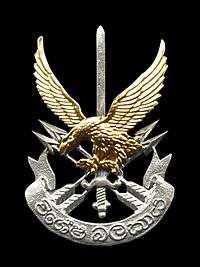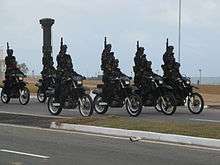Sri Lanka Army Special Forces Regiment
| Special Forces Regiment | |
|---|---|
 | |
| Active | December 1986 - Present |
| Country | Sri Lanka |
| Branch | Sri Lanka Army |
| Type | Special Forces |
| Role |
Asymmetric warfare, Counter Terrorism, Special Operations |
| Size | Four Regiments |
| Part of | Special Forces Brigade |
| Regimental Centre | Seeduwa |
| Nickname(s) | SF |
| Motto(s) | “Determined, Dared and Done”(අධිෂ්ඨානයෙන් අභීතව අරමුණ කරා) |
| Colours | Red and Black |
| Decorations | 2 Parama Weera Vibhushanaya |
| Commanders | |
| Colonel of the Regiment | Vacant |
| Notable commanders | Col A.F. Lafir PWV RWP RSP † |
| Insignia | |
| Identification symbol | Black beret with regimental cap badge with Jolly Roger skull-and-crossed-bones arm patch "Special Forces" shoulder tab |
The Sri Lanka Army Special Forces Regiment (SF) (Sinhalese: විශේෂ බලකාය Visesha Balakaya) is one of two special operations units of the Sri Lanka Army alongside the Sri Lanka Army Commando Regiment. Since its inception as a combat tracker team in 1986, the unit gradually expanded into a brigade consisting of several regiments. It is the most secretive unit in the Sri Lanka Army.
History
The Sri Lanka Army Special Forces evolved from organization initially known as “Combat Tracker Team”. This group at the inception in 1985 had two Officers and 38 men and was to be tasked to carry out small group operations which have capability of operating deep in enemy territory against LTTE terrorism in time of war. This Combat Tracker Team led by the dedicated and devoted leadership of Maj Gen (retired) G. Hettiarachchi, WWV, RWP, RSP, USP, psc from the Sri Lanka Armoured Corps (SLAC) (then Major) and Col A. F. Lafir, PWV, RWP, RSP, (posthumous) (Then Lt). Subsequently with the formation of the Special Service Group (SSG) the Combat Tracker Team becomes the reconnaissance element of the SSG. Later as the SSG concept failed to materialized, the Combat Tracker Team changes its name as Rapid Deployment Force (RDF) (Special Force) and operated independently. With the massive successful results of the RDF it was gradually expanded to 04 squadrons. In December 1988 the RDF (SF) was officially designated as 1 st Regiment Special Forces. At present the Special Forces consist of a Regimental Centre, SF Brigade, Training School, 4 Battalions and Regimental Headquarter Battalion –Special Forces.
Function

Current SF roles are believed to include:
- Intelligence collection in the deep battlespace.
- Battlespace preparation by sabotage and offensive raiding in the medium and deep battle-space (LRRP missions).
- Counter Terrorism operations
- Counter Proliferation operations
- Conducting unconventional warfare and special operations in remote, urban or rural environment, both overt and covert.
- Rapid deployment force to meet unforeseen circumstances.
- Black Ops of Long Range Reconnaissance Patrol (Sri Lanka) under Special Forces Regiment
Selection
Passing selection training to join the Sri Lankan Army Special Forces is extremely tough, but the regiment does not aim to break the men or shatter their morale, what it wants recruits who can think ahead with initiative and a strong drive of determination to accomplish mission objectives. To this end the regiment has devised a very thorough shifting process, one that ensures that only the right men and highest quality applicants are selected. Training is punishing to ensure that the Sri Lankan Army Special Forces Regiment remains a high quality revolutionary outfit in the country. The Selection test consists of several stages such as Weapons handling, underwater training, Close-Combat training, Live Ammunition training, Jungle warfare, survival, Reconnaissance, Sniper training etc. After undergoing basic military training, recruits are deployed into several treacherous terrains such as jungles without any equipment or weapons and are ordered to survive for a period as specified by the relevant instructors (usually 45–60 days).
The recruits who succeed this initial selection test are given several more selection tests based on physical fitness such as Sprinting 50 miles (80 Kilometers) within 12 hours without equipment, sprinting 5 miles (8 kilometers) within 40 minutes with equipment, mountain climbing, underwater diving etc. The recruits who pass these physical fitness selection tests are selected for special warfare training.The Recruits who qualify the special warfare training are given furthermore specialized training according to the special operative type they prefer. However, when selecting operatives for the LRRP (Long Range Reconnaissance Patrols) only the current(Active) servicemen of the Sri Lanka Army are admitted for selection with a service record and a medical report suiting the specifications of that of the LRRP selection course.[1][2]
Long Range Reconnaissance Patrol
The Long Range Reconnaissance Patrol (LRRP) is a covert operation (black ops) unit of the Sri Lanka Army. This unit is operated under the Directorate of Military Intelligence of the Army and for this LRRP, it is believed to be composed of personnel from the Commando Regiment and Special Forces Regiment.
Training
Special Forces Training School was established on 15 February 1992 and it is conducting the basic and specialized training for all Special Forces personnel. It also conducts special courses to train instructors from other battalions in the Army and has also helped to train Navy Special Boat Squadron personnel and Sri Lanka Air Force Regiment Special Force.
All SF personnel (regardless of their rank) have to undergo a refresher course (lasting one month) every year. There are no permanent members of SF, an individual will serve as long as he can live up to the set standards. Once declared unfit for their specialized duties, soldiers will be posted out of Special Forces.
- 1st Regiment Special Forces has a Combat Rider Squadron which consist of highly trained Special Forces soldiers who are mounted on motorcycles with cross country capability. They are proved to be forces to reckon-with, due to their quick reaction capability.They are usually deployed in operations such as Rapid Response,Dismounting special operations teams in deep battlespace,hit and run operations in deep battlespace, and Quick Assault.
- 2nd Regiment Special Forces was initially raised in 1994 with 3 Squadrons. Today it is a fully fledged battalion with 04 fighting squadrons. It has a diving team with assault boats and consisting of highly trained divers specialized in beach reconnaissance, surveillance and limited strike ops closer to beaches, and also under water demolition capabilities.
- 3rd Regiment Special Forces, which was established in 1996 as a Sea borne/combat diving force has now been tasked to operate on the ground role as another SF battalion as that role has been taken up by Special Boat Squadron of the Sri Lanka Navy. Today the 3rd Battalion Special Forces conducts special missions.
It also consists of Airborne Long Range Reconnaissance Patrols (LRRP,"Lurp teams").
- 4th Regiment Special Forces was established in 2008.
- 5th Regiment Special Forces, which was established in 2009, was disbanded on 1 April 2012.
- New special urban fighting squadron was rise on 16 April 2012 for Hostage Rescue and Counter Terrorism Missions.
Insignia
The insignia depicts Eagle has been regarded as symbol of courage and warlike qualities, a sing qua non for any member of the Special Forces. The superior imposition of the eagle indicated the ability the unit of scooping towards its prey. It is well equipped for its task with its hooked beak. Wonderful keen eyes help to locate the target, powerful wings help to rush to the target, curved talons help to grab the target and hooked bear help to destroy the target. All those magnificently adapted to its requirements.
Four Sharp Arrows- Placed on the background of the insignia and pointing to either side, depict the regiments basic concept of a 4 – man team and its capability of deep penetration(LRRP) into enemy territory and operating in small groups whose skills and have been sharpened as and arrows head. Placing them crossing each other is intended to give the idea of combined strength and mutual support within as well as with other forces in all types of operation.
Recipient of the Parama Weera Vibhushanaya
- Colonel A.F. Lafir PWV, RWP, RSP † - Former Commanding Officer of the 1st Regiment Special Forces
- Lieutenant Colonel J.A.L Jayasinghe, WWV, RWP, RSP † - Former Officer Commanding of M Sqn, 3rd Regiment Special Forces.
- Major Ajith Gamage PWV, RWP, RSP † - Former Officer Commanding of C Sqn
Notable members
- Major General G. Hettiarachchi, WWV, RWP, RSP, USP,
- Colonel A.F. Lafir PWV, RWP, RSP † - Former Commanding Officer of the 1st Regiment Special Forces
- Lieutenant Colonel J.A.L Jayasinghe, WWV, RWP, RSP †
- Colonel Harendra Ranasingle - Former Special Forces Brigade Commander
- Colonel Sujeewa Senarathyapa
- Colonel Nishanka Iriyagama
- Colonel Chandimal Pires
- Colonel Mahinda Ranasingle
- Colonel Ihalage
- Colonel Raj Vijesiri
- Major General Mahesh Senanayaka
- Major General Presanna Silva
- Lt Col Channe Waduge
- Major Darsham a Ratnayaka
- Major Upul Wirasinghe
- Brigadier Nirman Dharmaratna
Further reading
- The Perfect Soldier: Special Operations, Commandos, and the Future of U.S. Warfare by James F. Dunnigan[3]
Major General Mahesh Senanayake RWP RSP
See also
References
- ↑ http://www.facebook.com/pages/Sri-Lanka-Army-Special-Forces-Regiment-SF/28641274532
- ↑ "Kiswitekath sathurata yatath nowana ma"-Sri Lanka Army Special Forces
- ↑ Publisher : Citadel, Year:(June 1, 2003), Language: English, ISBN 0-8065-2415-4 / ISBN 978-0-8065-2415-3
External links
- Ministry of Defence Sri Lanka
- Sri Lanka Army
- ShadowSpear Special Operations - Sri Lanka Special Forces